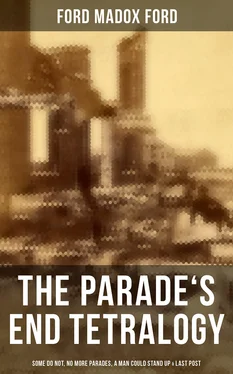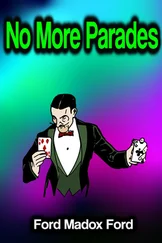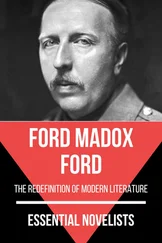‘I think it’s very bad management. I think this party’s very badly arranged.’ Mr Horsley she hardly thanked for the sole that he placed before her; Tietjens she did not even look at.
Sitting beside Macmaster, her eyes fixed on a small door in the corner of the panelled wall, Mrs Duchemin became a prey to a sudden and overwhelming fit of apprehension. It forced her to say to her guest, though she had resolved to chance it and say nothing:
‘It wasn’t perhaps fair to ask you to come all this way. You may get nothing out of my husband. He’s apt . . . especially on Saturdays . . . ’
She trailed off into indecision. It was possible that nothing might occur. On two Saturdays out of seven nothing did occur. Then an admission would be wasted; this sympathetic being would go out of her life with a knowledge that he needn’t have had—to be a slur on her memory in his mind . . . But then, overwhelmingly, there came over her the feeling that, if he knew of her sufferings, he might feel impelled to remain and comfort her. She cast about for words with which to finish her sentence. But Macmaster said:
‘Oh, dear lady!’ (And it seemed to her to be charming to be addressed thus!) ‘One understands . . . One is surely trained and adapted to understand . . . that these great scholars, these abstracted cognoscenti . . . ’
Mrs Duchemin breathed a great ‘Ah!’ of relief. Macmaster had used the exactly right words.
‘And,’ Macmaster was going on, ‘merely to spend a short hour; a swallow flight . . . “As when the swallow gliding from lofty portal to lofty portal!” . . . You know the lines . . . in these, your perfect surroundings . . . ’
Blissful waves seemed to pass from him to her. It was in this way that men should speak; in that way—steel-blue tie, true-looking gold ring, steel-blue eyes beneath black brows!—that men should look. She was half-conscious of warmth; this suggested the bliss of falling asleep, truly, in perfect surroundings. The roses on the table were lovely; their scent came to her.
A voice came to her:
‘You do do the thing in style, I must say.’
The large, clumsy but otherwise unnoticeable being that this fascinating man had brought in his train was setting up pretensions to her notice. He had just placed before her a small blue china plate that contained a little black caviare and a round of lemon; a small Sevres, pinkish, delicate plate that held the pinkest peach in the room. She had said to him: ‘Oh . . . a little caviare! A peach!’ a long time before, with the vague underfeeling that the names of such comestibles must convey to her person a charm in the eyes of Caliban.
She buckled about her her armour of charm; Tietjens was gazing with large, fishy eyes at the caviare before her. ‘How do you get that , for instance?’ he asked.
‘Oh!’ she answered: ‘If it wasn’t my husband’s doing it would look like ostentation. I’d find it ostentatious for myself.’ She found a smile, radiant, yet muted. ‘He’s trained Simpkins of New Bond Street. For a telephone message overnight special messengers go to Billingsgate at dawn for salmon, and red mullet, this, in ice, and great blocks of ice too. It’s such pretty stuff . . . and then by seven the car goes to Ashford Junction . . . All the same, it’s difficult to give a breakfast before ten.’
She didn’t want to waste her careful sentences on this grey fellow; she couldn’t, however, turn back, as she yearned to do, to the kindredly running phrases—as if out of books she had read!—of the smaller man.
‘Ah, but it isn’t,’ Tietjens said, ‘ostentation. It’s the great Tradition. You mustn’t ever forget that your husband’s Breakfast Duchemin of Magdalen.’
He seemed to be gazing, inscrutably, deep into her eyes. But no doubt he meant to be agreeable.
‘Sometimes I wish I could,’ she said. ‘He doesn’t get anything out of it himself. He’s ascetic to unreasonableness. On Fridays he eats nothing at all. It makes me quite anxious . . . for Saturdays.’
Tietjens said:
‘I know.’
She exclaimed—and almost with sharpness:
‘You know!’
He continued to gaze straight into her eyes:
‘Oh, of course one knows all about Breakfast Duchemin!’ he said. ‘He was one of Ruskin’s road-builders. He was said to be the most Ruskin-like of them all!’
Mrs Duchemin cried out: ‘Oh!’ Fragments of the worst stories that in his worst moods her husband had told her of his old preceptor went through her mind. She imagined that the shameful parts of her intimate life must be known to this nebulous monster. For Tietjens, turned sideways and facing her, had seemed to grow monstrous, and as if with undefined outlines. He was the male, threatening, clumsily odious and external! She felt herself say to herself: ‘I will do you an injury, if ever—’ For already she had felt herself swaying the preferences, the thoughts and the future of the man on her other side. He was the male, tender, in-fitting; the complement of the harmony, the meat for consumption, like the sweet pulp of figs . . . It was inevitable; it was essential to the nature of her relationship with her husband that Mrs Duchemin should have these feelings . . .
She heard, almost without emotion, so great was her disturbance, from behind her back the dreaded, high, rasping tones:
‘ Post coitum triste ! Ha! Ha! That’s what it is?’ The voice repeated the words and added sardonically: ‘You know what that means?’ But the problem of her husband had become secondary; the real problem was: ‘What was this monstrous and hateful man going to say of her to his friend, when, for long hours, they were away?’
He was still gazing into her eyes. He said nonchalantly, rather low.
‘I wouldn’t look round if I were you. Vincent Macmaster is quite up to dealing with the situation.’
His voice had the familiarity of an elder brother’s . And at once Mrs Duchemin knew—that he knew that already close ties were developing between herself and Macmaster. He was speaking as a man speaks in emergencies to the mistress of his dearest friend. He was then one of those formidable and to be feared males who possess the gift of right intuitions.
Tietjens said: ‘You heard!’
To the gloating, cruel tones that had asked:
‘You know what that means?’ Macmaster had answered clearly, but with the snappy intonation of a reproving Don:
‘Of course I know what it means. It’s no discovery!’ That was exactly the right note. Tietjens—and Mrs Duchemin too—could hear Mr Duchemin, invisible behind his rampart of blue spikes and silver, give the answering snuffle of a reproved schoolboy. A hard-faced, small man, in grey tweed that buttoned, collar-like, tight round his throat, standing behind the invisible chair, gazed straight forward into infinity.
Tietjens said to himself:
‘By God! Parry! the Bermondsey light middle-weight! He’s there to carry Duchemin off if he becomes violent!’
During the quick look that Tietjens took round the table, Mrs Duchemin gave, sinking lower in her chair, a short gasp of utter relief. Whatever Macmaster was going to think of her, he thought now. He knew the worst! It was settled, for good or ill. In a minute she would look round at him.
Читать дальше












